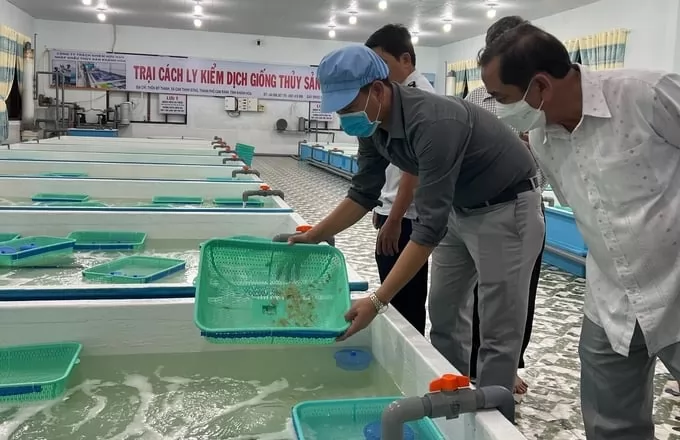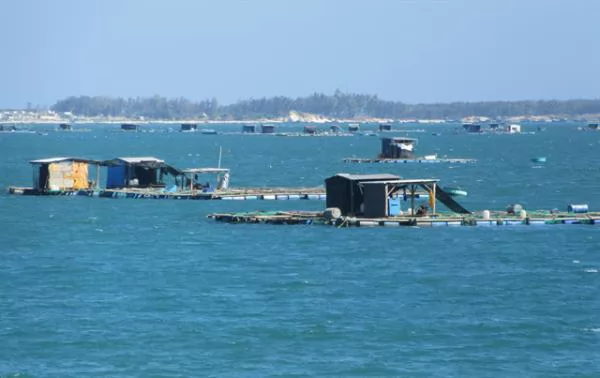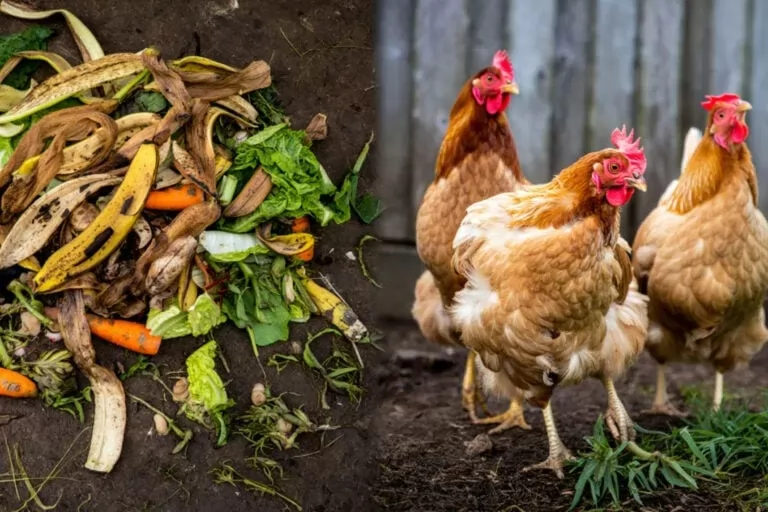Proposal to pilot quality control of the imported lobster breed

Cam Ranh Aquatic Quarantine Camp has strictly complied with the regulations on isolation and quarantine and ensuring the quality of lobster seeds. Photo: KS.
(VAN) Khanh Hoa proposes to allow localities to pilot testing of imported lobster breed samples registered for concentrated isolation in the area.
The centralized isolation and quarantine of lobster seeds is essential to ensure the quality of shrimp seeds for farmers and control disease to develop sustainable lobster farming. The Institute of Aquaculture of Nha Trang University cooperated with Khanh Hoa Seafood Import Co., Ltd. to build an isolation and quarantine facility for lobster hatchlings in Cam Ranh city. The facility went by the name Cam Ranh Aquatic Breeding Quarantine Camp and had its veterinary hygiene certified by the Department of Animal Health (Certificate No.96, dated September 7, 2021).
The People's Committee of Khanh Hoa province has also issued Official Letter No. 2534, dated March 22, 2022, on the centralized management of quarantine activities for lobster hatchlings, whereby organizing a pilot of concentrated quarantine and isolation of lobster hatchlings at Cam Ranh Aquatic Breeding Quarantine Camp with the agreement of the Ministry of Agriculture and Rural Development in Official Dispatch No. 9181 dated December 31, 2021.
Also, Khanh Hoa province directed the Department of Agriculture and Rural Development, the People's Committees of districts, towns, and cities to implement solutions to apply strict control of dangerous diseases and ensure the quality of imported lobster breeds imported into the province.
According to the Institute of Aquaculture, in 2022, Cam Ranh Aquatic Breeding Quarantine Camp received and conducted concentrated isolated quarantine (no service fee) for 11 lots of 582,000 lobster seeds, guaranteed to comply with regulations on isolation and quarantine as well as ensuring the quality of lobster seeds for importing enterprises.
After one year of pilot implementation, the concentrated isolation and quarantine initially brought effectiveness in terns of disease inspection, surveillance, and prevention. The pilot model helped to raise the awareness and responsibility of shrimp seeds importers about isolation and quarantine, ensuring disease safety, quality of lobster seeds as well as creating a place for farmers, Farmers' Associations, Cooperatives of districts in the province, and neighboring provinces to visit, learn, find understand and select quality seeds.

Imported lobster seeds. Photo: KS.
The camp is also a place for scientists to focus on research on lobsters and lobster diseases, as well as creating conditions for enterprises importing lobster seeds to have a safe isolation location. On the basis of free isolation service, lobster seeds businesses have conditions to stabilize prices for farmers. But apart from the good effects, some units still import lobster seeds to Khanh Hoa while not complying with the concentrated isolation regulations and seeking to avoid isolation or quarantine in contravention of the law.
The reason outside the intentional violation of the law by some lobster importers is that the Sub-Department of Animal Health Region IV normally takes samples and sends them to Da Nang city for testing, thereby prolonging the testing time, increasing costs for enterprises importing lobster seeds, and affecting economic efficiency.

Lobster farming on Van Phong bay (Khanh Hoa province). Photo: KS.
According to Khanh Hoa Department of Agriculture and Rural Development, the Animal Disease Diagnostic and Treatment Station (under the Khanh Hoa Sub-Department of Livestock and Veterinary) has been equipped with facilities and human resources. It can conduct tests for aquatic animal diseases in service of disease surveillance and quarantine for domestic transport of aquatic breeds. Also, it can detect diseases in lobsters to guarantee the quarantine work of imported lobsters into the province.
The problem is that the quarantine of imported lobsters, including taking samples for testing for dangerous diseases and testing and answering test results for imported lobsters, is within the functions and duties of the Department of Animal Health. This is stipulated in the Circular No. 26 dated June 30, 2016 of the Minister of Agriculture and Rural Development regulating the quarantine of aquatic animals and animal products.
Vice Chairman of Khanh Hoa People's Committee Tran Hoa Nam has just submitted a written request to the Ministry of Agriculture and Rural Development and Department of Animal Health to consider and allow pilot testing of lobster seeds samples at the Diagnostic, Testing, and Treatment Station. Animal diseases under Khanh Hoa Sub-Department of Livestock and Veterinary Medicine for imported lobsters registered for concentrated isolation at Cam Ranh Aquatic Breeding Quarantine Camp.
This creates favorable conditions for testing and returning results to enterprises importing lobster seeds, meeting the requirements of lobster seeds quality management, disease management, quarantine and developing lobster farming in Khanh Hoa province.
Author: Kim So
Translated by Ha Phuc
Maybe you are interested

Farmers expand breeding of high-value fish in floating cages in Ninh Thuận
NINH THUẬN - Farmers in the south-central province of Ninh Thuận are investing more in marine aquaculture as products could be sold for high price.

Turning organic waste and manure into valuable, sustainable feed
A research project in Sweden explored how valuable substances can be extracted from organic waste, such as food waste and animal manure, and how this loop can be closed by producing animal feed.
![[Last article]: Turn Hai Phong into a seafood processing centre](https://en.thuocthuydiemuyen.vn/upload/images/nam-2024/thang-01/20012024-133457-22488-a267e9e39612.webp)
[Last article]: Turn Hai Phong into a seafood processing centre
To fully exploit the huge and rare potential, Hai Phong has re-planned the farming area and plans to become a key seafood processing centre.


![[Last article]: Turn Hai Phong into a seafood processing centre](https://en.thuocthuydiemuyen.vn/upload/images/nam-2024/thang-01/thumbs/20012024-133457-22488-a267e9e39612.webp)


